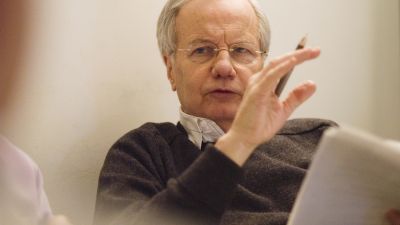New from Our Moyers on Democracy Guests
The Sum of Us: What Racism Costs Everyone and How We Can Prosper Together by Heather McGhee
As former president of the progressive thinktank Demos, Heather McGhee has spent her career in the fight against economic inequality. Her forthcoming book, The Sum of Us, illustrates how the wealthy and powerful in America have used race to divide a citizenship that might otherwise have found common economic ground. Through firsthand accounts of her childhood in Chicago’s South Side to eavesdropped conversations betraying the racial roots of powerbroking in our nation’s capital, McGhee puts forth a convincing — at times maddening — argument for racism’s cost to us all. Listen to McGhee in conversation with Bill just after the November election, and look out for The Sum of Us is out now.
How the South Won the Civil War: Oligarchy, Democracy, and the Continuing Fight for the Soul of America by Heather Cox Richardson
In her latest book, How the South Won the Civil War, Boston College professor Heather Cox Richardson links modern conservatives to their historical progenitors in the American South and West. The book documents a continuous struggle between oligarchy and democracy, in which equality for a ruling class — white males — continually relies on the subjugation of other groups. This “paradox of the founding” undermined the post-war Reconstruction period, allowing for the creation of Jim Crow laws in the South and later “Juan Crow” laws that discriminated against Mexicans in the American West. In this sweeping history, Richardson draws a throughline to our modern crisis of American democracy, writing that “[t]he world of 2018 looked a lot like that of 1860.” For more, listen to one of several conversations Bill and Heather shared this year, or read Letters from an American, Richardson’s daily analysis of current events through the eyes of a political historian.
Lying in State: Why Presidents Lie — And Why Trump is Worse by Eric Alterman
From the expert in presidential lying, a deep dive into the commander in chief with more lies to his name than any other. Eric Alterman, professor of English at Brooklyn College known for his long-time column in The Nation, follows up his highly regarded book, When Presidents Lie, with a focused account of Donald Trump’s pathologic dishonesty in office. Lying in State positions Trump as an executive exception: historically, presidents have been dishonest in order to advance a clear policy agenda; Trump seems to lie on a whim. But Alterman argues that the president’s proclivity for deceit makes sense in a broad political context, noting the Republican Party’s persistent rejection of scientific reality and the right-wing media’s commitment to amplifying any and all mistruths from conservative policymakers. Alterman joined Bill for Moyers on Democracy in September of this year to discuss his tenth book, Lying in State.
The Short Life & Curious Death of Free Speech in America by Ellis Cose
In this book, veteran journalist Ellis Cose enters the longstanding debate over free speech. The book’s arrival is timely: after witnessing an election in which hateful rhetoric and political misinformation ran rampant, many have grown suspicious of this cherished American right. According to Cose, we are in a full-blown free speech crisis; our new technological reality has altered the political and social landscape, minimizing the voices of ordinary individuals while amplifying those of the wealthy and powerful. Through a close examination of the fraught history of the First Amendment, Cose reveals how free speech has become a tool of suppression in the 21st century. He urges us to cast off the long-held assumption that more speech drives out bad speech, asking us to begin to think about how we can reclaim this right. Recently, Cose joined Bill to discuss this book and more on Moyers on Democracy.
The Shadow Network: Media, Money, and the Secret Hub of the Radical Right by Anne Nelson
With several decades of reporting under her belt, Anne Nelson has earned a reputation as a leading voice on media and human rights. Her latest book, The Shadow Network, exposes the secret web of right-wing organizations and special interest groups that are working to influence our democracy. In it, she shines a light on the far-right Council for National Policy, a little-known but profoundly powerful organization. Founded in 1981 by conservatives who feared the shifting demographics of America, this group now functions as the “nerve center” of the conservative movement, bringing together big donors, oil tycoons and politicians. This revelatory investigation helps us to understand how the American right spreads its message and promotes its pro-corporate agenda. For more on the book, listen to Nelson speak with Bill about dark money in Washington.
On Corruption in America: And What is At Stake by Sarah Chayes
For decades, writer Sarah Chayes worked to fight corruption abroad in places like Afghanistan and Nigeria. Now she is taking a close look at the issues brewing at home. In her latest book, Chayes argues that Americans live in a time of unprecedented corruption. As Chayes defines it, corruption is a system of interlocking networks that work to maximize the wealth and power of its members. She chronicles the history of corruption in America, taking us from the robber barons of the Gilded Age to Trump’s ploy for personal enrichment. This book pulls back the curtain on our political system, revealing how corrupt networks are organized and how crimes are covered. To learn more, listen to Chayes delve deep into her work on Moyers on Democracy.
The Age of Illusions: How America Squandered Its Cold War Victory by Andrew Bacevich
In his work, historian Andrew Bacevich focuses on American diplomatic and military history. His books Washington Rules: America’s Path to Permanent War and The Limits of Power: The End of American Exceptionalism take aim at the imperialistic streak that led our country into disasters. In his new book, The Age of Illusions, Bacevich argues that the Cold War victory changed how Americans thought of themselves. The win, he explains, created an illusion of American superiority, fortifying ordinary Americans’ faith in unfettered capitalism and relentless militarism. But since then, years of perpetual war and widening inequality have left Americans disillusioned. Bacevich strives to show how Donald Trump took advantage of this disillusionment throughout his presidential run, pointing to Trump’s promise to save Americans from “carnage.” For more of Bacevich, listen to him discuss his book with Bill on Moyers on Democracy.
Losing Reality: On Cults, Cultism, and the Mindset of Political and Religious Zealotry by Robert Jay Lifton
Historian and psychiatrist Robert Jay Lifton has dedicated his life to studying the causes and effects of 20th and 21st century atrocities. In Losing Reality, he explores the parallels between religious cults and radical political movements. Lifton closely examines the tactics of some of the most infamous extremist political leaders and religious zealots, from Hitler to apocalyptic cult leaders to Trump. Ultimately, he reveals that these politicians have cultist impulses, seeking, as zealots do, to own the human mind by controlling reality. This illuminating book probes deep into the psychology of authoritarianism, revealing that leaders like Trump ensnare supporters by manipulating the media and spreading misinformation. To learn more, listen to Lifton’s conversation with Bill on Losing Reality.
This Brilliant Darkness: A Book of Strangers by Jeff Sharlet
Last June, Bill spoke with journalist Jeff Sharlet about his work covering Trump’s hate-fueled presidential rallies. Before that, Sharlet’s investigative reporting had drummed up revelatory long-form narratives, like that of The Family, a religious organization pulling strings among Washington DC elite. Sharlet’s seventh book, published in February of 2020, told a different kind of story. In a New York Times review of This Brilliant Darkness, Jennifer Percy writes: “It’s as if there had been a net strung beneath the edits of [Sharlet’s] previous books and articles, catching all the incredible moments too enigmatic to fit a traditional story.” With a career as prolific as Sharlet’s, it’s no surprise that some gems would be left on the cutting room floor.



